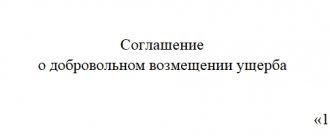Who takes TRU?
Acceptance of GWS is always carried out personally by the customer, or his authorized representative, the acceptance committee.
The contract department and its head perform the following duties and are vested with the following powers:
- fill out the schedule, develop the necessary changes for it, publish the schedule in the Unified Information System and its modified version;
- prepare and publish in the Unified Information System a notice of bidding, procurement documentation, draft contract, send invitations to suppliers to participate in a closed procedure;
- control the conduct of the event, including the conclusion of contracts;
- participate in cases of appealing the results of the selection of counterparties and collect materials for filing claims and claims in these proceedings;
- if necessary, at the procurement planning stage, organize consultations with suppliers to clarify the competitive environment in the market, analyze products and improve other indicators;
- perform other functions in accordance with contract legislation (Part 4 of Article 38 of 44-FZ).
The head of the contract service, as an official, is responsible for carrying out the procedure, including the execution of contracts (Part 2 of Article 38 of 44-FZ).
If the customer wishes to delegate the authority to accept goods to his representative, then he must provide for the procedure for acceptance and appoint an authorized person (Article 312 of the Civil Code of the Russian Federation). This person will single-handedly accept the GWS and sign the acceptance certificate.
Important point! Legislation prohibits purchasers from transferring the right to accept GWS to third parties - organizations under a contract. The Ministry of Economic Development reports this in its Letter dated February 6, 2021 No. OG-D28-1229.
When forming a commission group to carry out the acceptance of GWS, certain conditions must be met: it must consist of at least 5 people (there are no requirements for members of this group); all participants are specified in the order, as well as the order of their work. The acceptance certificate is signed by all members of the group and approved by the director of the organization.
SMP contract payment deadline
The general rule, regulated by the text of Federal Law No. 44, has exceptions. We are talking about government contracts signed during the procurement procedure among SONO and SMP. From January 1, 2021, Government Resolution No. 1205 came into force. Now the payment period for work, services, and goods for SMP is set at 15 days. Working days are counted. The starting point is the date of signing the act of acceptance of the GWS. All other categories of suppliers have the opportunity to pay within 30 working days.
In this case, it is necessary to fulfill this condition. Violation of payment deadlines for work performed, goods supplied, or services provided is punishable by penalties. Their size depends on the status of the violator: officials will have to pay 30-50 thousand rubles, legal entities - 50-100 thousand rubles.
Advice to the customer on payment terms and procedures
- You need to check the payment deadline according to Federal Law 44 - 15 days.
- You should not tie the payment period for SMP or SONO to the date of receipt of money for a certain cost item or the commissioning of the facility. The standard, according to Federal Law No. 44, is 30 days from the moment the acceptance document was signed.
- For each stage, clear payment dates must be indicated. The customer can do this at one time in a situation where he has time within the 30-day period from the date of signing the first acceptance paper.
- The payment period must be reconciled with the developed schedule. It is worth adhering to the payment deadline under 44 Federal Laws.
- It is allowed to specify a condition regarding the reduction of the total amount under the contract by the amount of the accrued penalty.
It is convenient to search for commercial and government procurement carried out in accordance with Federal Law No. 44, 223, as well as Government Decree No. 615 using the Astral.Supplier service. It becomes much easier to study the market and choose the best offer available.
Acceptance of goods, works, services: types, stages, features
In addition to all the above conditions, the acceptance of GWS has some features. For example, the result of these measures can be not only positive, but also negative, that is, the customer may refuse to accept the goods.
In case of successful acceptance of fulfilled obligations, a corresponding document is drawn up and signed by the customer. And if a commission group worked, then each of its representatives signs the document, and then it is approved by the customer (Part 7 of Article 94 of 44-FZ).
If the customer refuses to accept the GWS, then he must prepare a reasoned refusal and send it to the counterparty (Part 7 of Article 94 of 44-FZ).
Contract legislation obliges customers to check the goods received or the results of work or services. For these purposes, they can attract experts or expert organizations (Part 3 of Article 94 of 44-FZ).
Important point! According to Part 8 of Article 94 of 44-FZ, the customer may continue to accept goods even if some inconsistencies with the provisions of the contract were found, provided that these inconsistencies do not affect acceptance and are corrected by the contractor.
If the procurement specified the requirements for securing warranty obligations, then acceptance of the GWS is carried out only after the contractor provides such security (Part 7.1, Article 94 of 44-FZ).
There are two types of acceptance: full and partial (selective). In the latter case, the results of a random check may apply to the entire batch of products, if this does not contradict the standards, technical conditions, delivery specifics, other rules or the contract.
Stages of goods acceptance:
- acceptance is carried out in strict accordance with the specification and the items specified in it;
- the product is checked visually for visible defects or defects;
- checking the quantity of goods and completeness, since the supplier may intentionally or accidentally fail to deliver the products;
- checking product quality, including identifying hidden damage and defects;
- identification of deficiencies that need to be corrected based on the warranty obligations of the contractor or manufacturer.
Along with the goods, the supplier is obliged to transfer all its accessories and documentation:
- technical certificate;
- quality certificate;
- operating instructions,
- technical documents necessary for the operation of equipment, etc.
If the customer has complaints about the quality of products, then he must understand what he wants from the supplier to eliminate these shortcomings. If the deficiencies cannot be corrected, then you can terminate the contract unilaterally and adhere to the procedures provided for by contract law.
Before signing the acceptance certificate, you must:
- prepare an incoming control document;
- study the accompanying papers (certificate, registration certificate, etc.);
- inspect the external condition of the products, packaging, labeling;
- carry out an examination if there are suspicions of internal defects.
If there are doubts about the correctness of the accompanying documents or if a discrepancy is detected in the external condition of the products, you must:
- refuse acceptance by making a scan or photo of these papers;
- put a mark on the invoices about the refusal to accept the goods, indicating the reasons that led to such a decision, take a photo or scan of the invoices;
- organize storage of products (clause 1 of Article 514 of the Civil Code of the Russian Federation).
Based on the order of the director of the organization, re-admission may be initiated in the presence of a commission group. And then carry out all the stages of acceptance as the first time: external inspection, study of documentation, etc.
"VAT" - what is it?
VAT is a 20% tax (in most cases) on value added. It is levied on organizations operating under the general tax system (OSNO) and creating additional market value. Simply put, this is when organizations add an additional amount to the cost, and then part of this amount is returned to the budget. Organizations offer goods, perform work, provide services at a higher price than their cost.
From 2021, for general cases the rate is 20% (0% for international transport, 10% for the sale of food, newspapers, magazines, medical products, etc., this is stated in Article 164 of the Tax Code of the Russian Federation).
The difference between the cost of production and the price at which it is sold will be considered such a tax.
In our country, VAT has been applied since 01/01/1992. Initially, it was calculated in the manner approved by the law “On Value Added Tax”; since 2001, it has been subject to Chapter 21 of the Tax Code of Russia.
You can calculate VAT on the website https://www.ndscalc.ru/ using the online calculator. VAT calculation is a key accounting criterion for any organization working with OSNO. Beginning businessmen and managers do not understand enough the VAT allocation procedure. However, mistakes are unacceptable here; the fee may be very high. An online calculator will help you allocate and calculate value added tax without delving into mathematical complexities.
Examination: features of the conduct
There are 3 types of examination:
- Examination of documents;
- Examination of the subcontractor’s performance results;
- Expertise by the customer (internal inspection).
If the customer involves an expert or expert organization in the procedure, then such relationships between the parties are documented. The contract for the provision of expert services specifies:
- subject of inspection;
- powers of the inspector;
- conditions for admission to the examination (qualification of the expert and timing of the examination). The examination must be carried out without violating the delivery time of products.
For any outcome of acceptance, positive or negative, the customer and the commission must be guided by the results of the experts’ work, which they reflect in the corresponding conclusion.
Invitation to inspect the goods
If the responsible representative of the contractor was not present at the acceptance of the products, the customer sends an invitation to the contractor to inspect the goods within 1 day when inconsistencies were identified.
The invitation letter must contain the following points:
- name of products and day of shipment;
- number of the waybill;
- quantity of low-quality products, their price, nature of the defect/defect;
- condition of the fillings;
- date of joint acceptance;
- location;
- contacts
When re-accepting, the letter must reflect:
- address and date;
- composition of the commission group;
- information about improper goods.
- Re-acceptance and its features
If a repeated procedure was initiated, then this fact must be reflected in the act in the TORG-2 form. The document lists only those products for which defects or damage were found. For other goods, the following wording will suffice: “For other inventory items there are no discrepancies.”
For foreign products, a form according to the TORG-3 form is used.
Acceptance certificate
This document is drawn up in 2 copies - one for each party. It is signed by all acceptance participants: supplier, customer, commission members, experts. If one of the participants refuses to sign the act, then this fact is written down in the document.
In the act, marks are made for each item from the list of products so that the condition of each of them is clearly visible (type, brand, packaging, quantity, etc.). The document is sent to the customer’s accounting department so that in case of claims the claim amount can be calculated.
In case of repeated acceptance, this event is noted in the accompanying papers.
Recommendations to the customer on 223-FZ
Based on the previous paragraph of this article, the customer can be given 3 simple tips for evaluating proposals from potential contractors. Compliance with them will help avoid some controversial issues in the future.
- Decide on the approach to evaluating applications from future suppliers, which one is most convenient for you and optimal, taking into account current practice: take into account VAT or not when comparing applications.
- Write down your clear requirements in the procurement regulations and procurement documentation.
- Compare price offers strictly in accordance with the terms of the documentation.
Unilateral termination of the contract
If the defects of the goods cannot be eliminated, the customer may terminate the obligations unilaterally. At the same time, he draws up a claim, on the basis of which he can collect a fine from the counterparty.
Unilateral termination of the contract provides for:
- stipulating in the contract the responsibility of the parties for poor performance or failure to fulfill obligations (Part 4 of Article 34 of 44-FZ), penalties and fines for failure to comply with payment deadlines (Part 5 of Article 34 of 44-FZ);
- if some conditions and obligations upon termination of obligations are not specified in contract legislation, then it is necessary to be guided by the Civil Code of the Russian Federation and standards that do not diverge from the provisions of 44-FZ;
- If deficiencies are identified during the examination, a corresponding report is drawn up.
Terms of unilateral termination of the contract:
- after making a decision on a unilateral refusal, the customer publishes it in the Unified Information System within 3 days and sends a notification about it to the counterparty;
- if the supplier manages to eliminate the identified deficiencies within 10 days, then the customer cancels the decision that has not yet entered into force (Part 14 of Article 95 of 44-FZ);
- according to Part 13 of Article 95 of 44-FZ, the customer’s decision on unilateral termination begins to take effect, that is, the contract is considered terminated, 10 days after the counterparty was informed about it.
Article 95 of 44-FZ is devoted to unilateral termination of a contract. Here are all the situations in which a contract can be terminated. The main emphasis is on the fact that this measure is possible when low-quality products are supplied or the contractor does not comply with the conditions specified in the procurement documentation.
The supplier is given 10 days to correct any discrepancies found. During this period, he can provide a quality product or prepare a complaint about the customer’s claim with a reasoned argument. If the supplier has not taken any action to eliminate the deficiencies, then the contract becomes terminated, and the customer has the right to organize new tenders using a simplified algorithm and in a short time.
Clarifications from the Ministry of Finance and the Ministry of Economic Development on the application of the norms of Law No. 44 Federal Law
| The article provides explanations from specialists from departments such as the Ministry of Finance and the Ministry of Economic Development on the application of certain norms of the Federal Law of April 5, 2013 No. 44 FZ “On the contract system in the field of procurement of goods, works, services to meet state and municipal needs” (hereinafter referred to as the Law No. 44 Federal Law). | Articles on the topic: - Law on the contract system since 2015 - Contract system: subsidies and compulsory medical insurance funds - AC procurement: violations and liability - Organization of AC procurement within the framework of Federal Law 223 - Mandatory state conditions. contract |
Involving experts and specialists in criminal proceedings: is it necessary to apply the provisions of Law No. 44-FZ?
The Ministry of Economic Development and the FAS in a joint Letter No. 4332-EE/D28i, No. AC/7864/14 dated 03/05/2014 on this issue concluded that the work (services) is carried out by experts, specialists, translators and other participants in criminal proceedings in order to protect the rights and freedoms of the accused (suspect), therefore they cannot be qualified as work (services) in the field of procurement for state and municipal needs.
Thus, the provisions of Law No. 44-FZ do not apply to relations related to the involvement of these persons.
Specialists from these departments reasoned as follows. Law No. 44-FZ regulates relations aimed at meeting state and municipal needs, in terms of planning the procurement of goods, works, services, identifying suppliers (contractors, performers), concluding a civil agreement (contract), the subject of which is the supply of goods , performance of work, provision of services, features of contract execution, procurement monitoring, as well as audit and control in the field of procurement.
In accordance with parts 1, 2 of Art. 1 of the Code of Criminal Procedure of the Russian Federation, the procedure for criminal proceedings on the territory of the Russian Federation is established by the Code of Criminal Procedure of the Russian Federation. It is mandatory for courts, prosecutors, preliminary investigation and inquiry bodies, and other participants in criminal proceedings.
The procedure for appointing experts, attracting specialists and translators in criminal proceedings is determined by the provisions of the Code of Criminal Procedure of the Russian Federation, which do not allow the application of Law No. 44-FZ for the purpose of regulating legal relations between preliminary investigation bodies, investigative bodies and appointed (involved) experts, specialists, translators. For example, Part 1 of Art. 162 of the Code of Criminal Procedure of the Russian Federation establishes that the preliminary investigation in a criminal case must be completed within a period not exceeding two months from the date of initiation of the criminal case. Articles 69, 70, 71 of the Code of Criminal Procedure of the Russian Federation provide for the possibility of challenge by an inquiry officer, investigator, prosecutor or court of translators, experts, and specialists.
Conclusion of a contract based on the results of closed methods: is it necessary to include relevant information in the register of contracts?
Let us remind you that within three working days from the date of conclusion of the contract, the customer sends the information specified in clause 1 - 7, 9, 12, 14, part 2 of Art. 103 of Law No. 44-FZ information to the federal treasury authority.
Information on the conclusion of a contract based on the results of the procurement of goods, works, services using a closed method of identifying a supplier (contractor, performer), which does not contain information constituting a state secret, is included in the register of contracts concluded by customers (letter of the Ministry of Finance of the Russian Federation dated April 14, 2014 No. 02- 02‑06/16835, Federal Treasury dated 04/23/2014 No. 42‑7.4‑05/5.7‑272).
To support their conclusion, financial department specialists cited the following standards. The composition of documents and information included in the register of contracts concluded by customers is specified in Art. 103 of Law No. 44-FZ. In particular, according to Part 7 of this article, information on the procurement of goods, works, services, and the conclusion of contracts, which constitute a state secret, is included in a separate register of contracts. This information is not subject to publication in the media and posting on the Internet, nor is it posted in the unified information system (Part 4, Article 4 of Law No. 44-FZ).
Closed methods for identifying suppliers (contractors, performers) are used in the following cases (Article 84 of Law No. 44-FZ):
1) procurement of goods, works, services, information about which constitutes a state secret, provided that such information is contained in the procurement documentation or in the draft contract;
2) in other cases provided for in clauses 1, 3, 4, part 2, art. 84 of Law No. 44-FZ, in the absence of information constituting a state secret, including in the case of the procurement of goods, works, services necessary to meet federal needs, if information about such needs constitutes a state secret.
Suppliers (contractors, performers) are determined in a closed manner in the cases mentioned in clause 2, in order to limit the circle of procurement participants, and not for the purpose of not posting information about closed procurement methods in the unified information system in the field of procurement.
Execution and payment of individual stages of the contract: does the customer need to include information about them in the register of contracts?
The Ministry of Finance considered this issue in Letter No. 02‑02‑07/25618 dated May 28, 2014 and explained that if the customer has documents confirming the execution of a stage of the contract, that is, documents confirming the occurrence of a monetary obligation for partial delivery of goods, partial completion of work , provision of services, or documents confirming payment for a stage of the contract, the customer submits information to the Federal Treasury about the execution of each fact of payment for a stage of the contract in the prescribed manner.
To justify their answer, the Ministry of Finance specialists cited the following arguments. According to the principle of openness and transparency of the contract system in the field of procurement, the information provided for by Law No. 44-FZ and posted in the unified information system must be complete and reliable. This allows us to ensure openness and transparency in the expenditure of budgetary funds (funds from a budgetary institution) on procurement.
Article 103 of Law No. 44-FZ establishes that the information specified in clauses 8, 10, 11 and 13 of part 2 of the same article is sent by customers to the Federal Treasury within three working days from the date of the corresponding change in the contract, execution of the contract, termination contract, acceptance of goods delivered, work performed, services rendered.
Execution of the contract in accordance with the provisions of Art. 94 of Law No. 44-FZ provides, among other things:
- acceptance of the delivered goods, completed work (its results), rendered services, as well as individual stages of delivery of goods, performance of work, provision of services provided for in the contract;
- payment by the customer for the delivered goods, work performed (its results), services rendered, as well as individual stages of contract execution.
In this case, the contract may provide for phased execution and payment of the contract (clause 2, part 3, article 21 of Law No. 44-FZ)
Purchase for cash: what are the features of applying the norms of Law No. 44-FZ and authorizing their payment?
Part 2 of the joint Letter of the Ministry of Economic Development of the Russian Federation No. 18505-EE/D28i, the Ministry of Finance of the Russian Federation No. 02-02-04/39043 dated 05.08.2014 provides the following explanations.
In accordance with the provisions of paragraph 15 of Art. 34 of Law No. 44-FZ when concluding a contract in the cases provided for in clauses 4, 5, part 1, art. 93 of Law No. 44-FZ, a contract can be concluded in any form provided for by the Civil Code of the Russian Federation for transactions.
These purchases are not included in the register of contracts and in the contract execution report (Part 1, Article 103, Part 9, Article 94 of Law No. 44-FZ).
Payment by customers of obligations related to the specified purchase of goods, works and services can be made in cash, including by issuing accountable amounts to employees for the purchase of goods, works and services, taking into account the maximum amount of cash payments in the Russian Federation between legal entities one by one deal.
Customers whose personal accounts are opened in the territorial bodies of the Federal Treasury carry out transactions to pay for such purchases in accordance with the Rules for providing cash to organizations whose personal accounts are opened in the territorial bodies of the Federal Treasury, approved by Order of the Ministry of Finance of the Russian Federation dated December 31, 2010 No. 199n.
By virtue of the provisions of clause 2.2 of Procedure No. 98n [1], budgetary obligations of recipients of federal budget funds, the amount of which does not exceed the maximum amount of cash settlements established by the Central Bank of the Russian Federation in the Russian Federation between legal entities and the payment of which is made in cash, are subject to registration by the authorities of the Federal Treasury on the basis of applications for receipt of funds accepted for execution, without the recipients of federal budget funds submitting information about the accepted budget obligation to the Federal Treasury authorities (f. 0531702).
Authorization of payment of the specified obligations of recipients of federal budget funds is carried out in accordance with Procedure No. 87n [2], without submitting to the Federal Treasury authorities documents confirming the occurrence of monetary obligations (invoice, acceptance certificate, certificate of work performed (services rendered), invoices, invoices ).
Reimbursement for employees and employees of travel expenses: is this a procurement in accordance with the provisions of Law No. 44-FZ?
Reimbursement of travel expenses to employees in cash is not a procurement and, accordingly, is not subject to inclusion in the procurement plan and procurement schedule, or in the register of contracts.
If the customer considers it necessary to conclude a contract for the provision of services related to sending an employee on a business trip, for example, in order to ensure travel to and from the place of the business trip, rental of living quarters, transport services, then the said contract must be concluded in accordance with paragraph. 26 hours 1 tbsp. 93 of Law No. 44-FZ and information about the implementation of this purchase is indicated in the procurement plan, schedule, as well as in the register of contracts.
Based on the designated contract, the employee is provided with services in kind (travel ticket, hotel accommodation).
The above response was published in part 1 of the Letter of the Ministry of Economic Development of the Russian Federation No. 18505-EE/D28i, the Ministry of Finance of the Russian Federation No. 02-02-04/39043.
A little earlier, in Letter of the Ministry of Finance of the Russian Federation dated July 31, 2014 No. 03-03-07/37921, the issue of the specifics of authorizing federal budget expenses related to the payment by recipients of federal budget funds of air and railway tickets when sending employees on a business trip was considered. From the explanations given in it by specialists of the financial department, we present the following conclusions:
1) in case of purchasing a ticket directly from the carrier, a contract is not required;
2) in the case of purchasing tickets through an intermediary organization, the cost of services of which is fixed on special forms, the customer is obliged to comply with the requirements of Art. 34 of Law No. 44-FZ. If the cost of the services of an intermediary organization does not exceed 100 thousand rubles. (in established cases - 400 thousand rubles), such a contract can be concluded in any form provided for by the Civil Code of the Russian Federation for transactions, including by issuing an invoice by an intermediary organization. Moreover, the requirements of Parts 4 – 9, 11 – 13 of Art. do not apply to the said contract. 34 of Law No. 44-FZ.
If the cost of the services of an intermediary organization exceeds the above amount, then, according to the Ministry of Finance, the customer is recommended to conclude a contract by signing it by the parties. Norms clause 26, part 1, art. 93 of Law No. 44-FZ allows, in order to conclude such a contract, to purchase from a single supplier (contractor, performer). This position has been sent for approval to the Ministry of Economic Development.
It should be noted that if the cost of services of an intermediary organization is not included in the ticket price, advance payment of intermediary services in the amount of 100% is not allowed;
3) According to the provisions of Procedure No. 98n, budget obligations accepted in accordance with government contracts, other agreements for the purchase of goods, works, services concluded with recipients of federal budget funds, for which registration in writing is not required
, are accepted for accounting on the basis of documents accepted for execution by the Federal Treasury authorities for payment of monetary obligations submitted by recipients of federal budget funds.
By virtue of the provisions of paragraphs. 16 clause 5 and clause 7 of Procedure No. 87n the Federal Treasury body has the right to authorize the payment of monetary obligations of the recipient of federal budget funds if a document confirming the occurrence of a monetary obligation in the provision of services is submitted in the prescribed manner to the Federal Treasury body, along with an application for cash expenses ( certificate of services rendered, invoice, invoice).
Providing a bank guarantee: in which account should it be taken into account?
According to Art. 44 of Law No. 44-FZ, when conducting competitions and auctions, the customer is obliged to establish requirements for securing applications. Security for an application for participation in a competition or closed auction can be provided by the procurement participant by depositing funds or a bank guarantee
. In addition, the provision of a bank guarantee can ensure the execution of a contract (Article 96 of Law No. 44-FZ).
The Ministry of Finance on the issue of the accounting procedure for bank guarantees reported the following in Letter dated June 27, 2014 No. 02-07-07/31342.
Bank guarantees provided to secure participation in a competition (closed auction), as well as to secure the execution of a contract in accordance with clause 351 of Instruction No. 157n [3] are subject to accounting in off-balance sheet account 10 “Security for the fulfillment of obligations.” In particular, the security of an obligation in the form of a bank guarantee is reflected in this off-balance sheet account on the date of its provision. The disposal of a bank guarantee from accounting on an off-balance sheet account is reflected in the account with a minus sign on the date of termination of the obligation for which it was issued (the date the counterparty fulfills the obligations secured by the guarantee or the date the guarantor fulfills the beneficiary's demands for payment of a sum of money in connection with the principal's violation of the obligation secured which the guarantee was issued).
The Ministry of Finance draws attention to the fact that funds
, received as security for participation in a competition or closed auction, as well as as security for the performance of a contract, are
not taken into account
.
Procurement commission: is it necessary to make a decision on its creation before each procurement?
Federal Treasury in paragraph 1 of Letter dated March 25, 2014 No. 42-7.4-05/9.3-191 on the question of the need for the customer to make a decision on creating a procurement commission before each purchase and about the possibility of the customer creating a single commission in the same composition and on The following was answered on a regular basis.
According to Part 1, 2 Art. 39 of Law No. 44-FZ, to determine suppliers (contractors, performers), with the exception of purchases from a single supplier (contractor, performer), the customer creates a procurement commission (hereinafter referred to as the commission). The decision to create such a commission is made by the customer before the start of the procurement.
Moreover, on the basis of Part 3 of Art. 39 of Law No. 44-FZ, the customer may create competitive, auction, quotation commissions, commissions for reviewing applications for participation in the request for proposals and final proposals and unified commissions that carry out procurement functions through tenders, auctions, requests for quotations, requests for proposals.
In other words, the customer is obliged to decide on the creation of a commission before the procurement, with the exception of procurement from a single supplier (contractor, performer), having determined the composition of the commission and the procedure for its work, appointing its chairman.
In addition, part 3 of Art. 39 of Law No. 44-FZ directly provides for the possibility of creating a single commission for procurement.
Consequently, Law No. 44-FZ allows the creation of both a single commission and competitive, auction, quotation commissions, commissions for reviewing applications for participation in the request for proposals and final proposals before each procurement.
Conclusion of a contract: is it mandatory to indicate that it is being concluded on behalf of the Russian Federation?
From paragraphs 3, 4, 8 of Letter of the Federal Treasury No. 42-7.4-05/9.3-191 it follows:
- in the preamble of a state contract it must be stated that it is concluded “on behalf of the Russian Federation”;
- when concluding a contract with a single supplier (contractor, performer) for the purchase of goods (works, services), it is necessary to indicate the name “state contract”, and in the preamble - “on behalf of the Russian Federation”.
To confirm this conclusion, the specialists of this department provided the following standards in the letter. Law No. 44-FZ regulates relations aimed at meeting state and municipal needs in order to increase the efficiency and effectiveness of procurement of goods, works, services, ensure openness and transparency of these procurements, prevent corruption and other abuses in the field of such procurement, in part, relating, inter alia, to the conclusion of a civil contract, the subject of which is the supply of goods, performance of work, provision of services (including the acquisition of real estate or rental of property), on behalf of the Russian Federation, a constituent entity of the Russian Federation or a municipal entity, as well as a budgetary institution or other a legal entity in accordance with Parts 1, 4 and 5 of Art. 15 of Law No. 44-FZ (clause 3, part 1, article 1 of Law No. 44-FZ).
Article 3 of Law No. 44-FZ defines the concept of a state contract, which is an agreement concluded on behalf of the Russian Federation by a state customer to meet state needs.
Until the release of the relevant clarifications from the Ministry of Economic Development (FAS), the Federal Treasury recommends that the customer enter into government contracts on behalf of the Russian Federation, including all the mandatory conditions provided for by Law No. 44-FZ.
Contract execution report: what are the features of its preparation?
According to Part 9 of Art. 94 of Law No. 44-FZ, the results of a separate stage of contract execution (with the exception of a contract concluded in accordance with clause 4 or 5 of Part 1 of Article 93 of Law No. 44-FZ (cases of procurement from a single supplier)), data on the goods supplied, work performed or service provided are reflected by the customer in a report posted in a unified information system and containing information:
- on the execution of the contract (the results of a separate stage of contract execution, the delivery of goods, the work performed or the service rendered, including their compliance with the schedule), on compliance with the interim and final deadlines for the execution of the contract;
- about improper performance of the contract (indicating the violations committed) or about non-fulfillment of the contract and about the sanctions that were applied in connection with the violation of the terms of the contract or its non-fulfillment;
- about changes or termination of the contract during its execution.
The Ministry of Finance in Letter dated 07/07/2014 No. 02‑02‑06/32616 considered the issue of documents that must be attached to the report on the execution of a state (municipal) contract and (or) on the results of a separate stage of its execution, as well as the procedure for filling out the report for for the purposes of confirming the fulfillment of the contract and the accrual or payment of a penalty and reported the following.
Part 10 of Art. 94 of Law No. 44-FZ stipulates that the report shall be accompanied by a conclusion based on the results of the examination of a particular stage of execution of a contract, goods supplied, work performed or services rendered and a document on acceptance of such results or another document determined by the legislation of the Russian Federation. The requirement to attach other documents to the report is not established by Law No. 44-FZ.
These norms are specified in the Regulations on the preparation and placement in a unified information system in the field of procurement of a report on the execution of a state (municipal) contract and (or) on the results of a separate stage of its execution, approved by Decree of the Government of the Russian Federation of November 28, 2013 No. 1093 (hereinafter referred to as Regulation No. 1093). This resolution also does not contain provisions providing for the attachment of documents other than the documents specified in Part 10 of Art. 94 of Law No. 44-FZ.
Consequently, attachments to the report of the customer’s payment orders for payment of the contract are not required.
At the same time, according to paragraphs. “c” and “d” clause 27 of Regulation No. 1093 in sections III and IV of the report form:
- the column “Document confirming fulfillment” for indicators 1 and 2 is not filled in; for indicators 3 and 4, this column indicates the name and details of the document confirming the fulfillment of the obligation to pay or supply (fulfillment, provision) of goods, works, services;
- in the column “Document confirming the accrual or payment of a penalty”, according to the relevant indicators, the names and details of the documents confirming the accrual or payment of a penalty are written down.
Links:
[1] The procedure for accounting for budgetary obligations of recipients of federal budget funds, approved. By Order of the Ministry of Finance of the Russian Federation dated September 19, 2008 No. 98n.
[2] The procedure for authorizing the payment of monetary obligations of recipients of federal budget funds and administrators of sources of financing the federal budget deficit, approved. By Order of the Ministry of Finance of the Russian Federation dated September 1, 2008 No. 87n.
[3] Instructions for the application of the Unified Chart of Accounts for public authorities (state bodies), local governments, management bodies of state extra-budgetary funds, state academies of sciences, state (municipal) institutions, approved. By Order of the Ministry of Finance of the Russian Federation dated December 1, 2010 No. 157n.
O. Zabolonkova editor of the magazine “Power Ministries and Departments: Accounting and Taxation”
How customers act when violations of contract terms are detected
According to Part 15 of Article 95 of 44-FZ, the buyer must make a decision on unilateral termination of obligations if it is revealed that the supplied products do not meet the requirements that were specified in the notice and procurement documentation.
If the counterparty provides a low-quality product for the second time, then it no longer has the right to correct the discrepancies. If the customer repeatedly discovers substandard products, the contract will be terminated within 10 days after the supplier receives notification of the customer’s decision.
Important point! The buyer may not file a claim or demand that deficiencies be corrected. He has the right to immediately decide to unilaterally terminate the contract and notify the counterparty about it. This measure will oblige the contractor to eliminate inconsistencies within the approved time.
- Conclusion
Acceptance of goods, work products or services is a responsible process for both customers and suppliers. Contractors must be attentive to the quality and volume of products supplied, the availability of the entire set of accompanying papers, and compliance with the terms of the contract.
The legislation allows customers to involve experts or expert organizations in acceptance, and during such an inspection, if there are deficiencies, damage, manufacturing defects, etc., they will certainly be found. And this threatens the contractor with fines, costs for replacing products, loss of the contract, and compensation to the customer for the costs of conducting the examination.
Expertise can be internal (employees of the customer’s organization) and external (with the involvement of experts or expert organizations). If the procurement is carried out with the implementation of an examination, then this fact is noted in the Unified Information System.
When drawing up documentation and making decisions, the customer is obliged to be guided by the results of the activities of the inspectors, documented in the expert report.
You might be interested in:
- INSTRUCTIONS ABOUT THE PROCEDURE FOR ACCEPTANCE OF GOODS BY QUANTITY
- ELECTRONIC ACCEPTANCE REPORT
- Deadlines for filing a complaint under 223-FZ
- FAS. Composition, sequence and timing of administrative procedures
- VIOLATION OF DELIVERY TIMES OF GOODS UNDER CONTRACT 44-FZ
- Purchase of domestic goods taking into account KTR
- COUNTRY OF ORIGIN OF THE PRODUCT
- QUANTITY OF GOODS IN THE FIRST PART OF THE APPLICATION
- COMPLIANCE OF THE PRODUCT WITH GOVERNMENT STANDARDS
- SPECIFIC PRODUCT INDICATORS WHEN PURCHASING WORKS AND SERVICES
Recommendations for the procurement participant
- Carefully study the procurement documentation before participating in the procedure for payment. If you do not find the wording “Without VAT”, then take the opportunity to send the customer a request for clarification, ask to clarify this point and add the necessary wording.
Important point! If the purchase is carried out with the customer’s own money, and not from the budget, and this is stated in the documentation, then the customer’s requirement to conclude a contract with VAT is legal. The judiciary is of this opinion.
- If the purchase has already taken place and you have received a draft contract with VAT from the customer, send him a protocol of disagreements with a request to indicate the price “Without VAT”, because you work for the simplified tax system.
- If the contract is signed with VAT, do not send an invoice to the customer.
- In the application, immediately indicate that you are on a “simplified” tax and are not VAT payers. Additionally, you can submit, along with the application, a Notification of the transition to the simplified tax system (form No. 26.2-1) with a mark from the tax office.
- If the customer organized the procedure at his own expense and indicated the price including VAT, then think carefully about the profitability of such work. In most cases, such conditions will be unprofitable for simplifiers.








